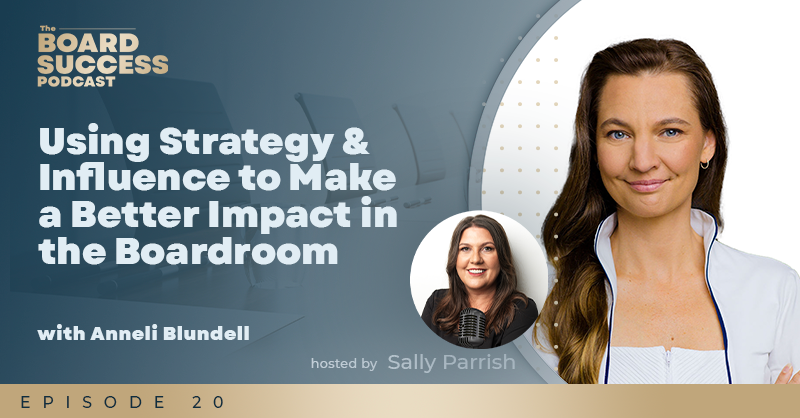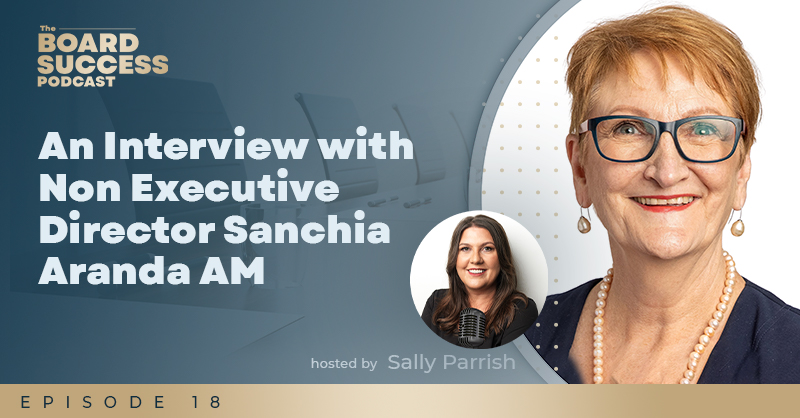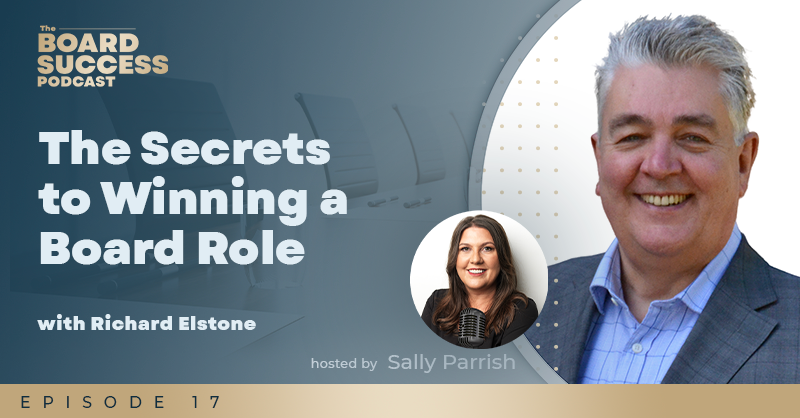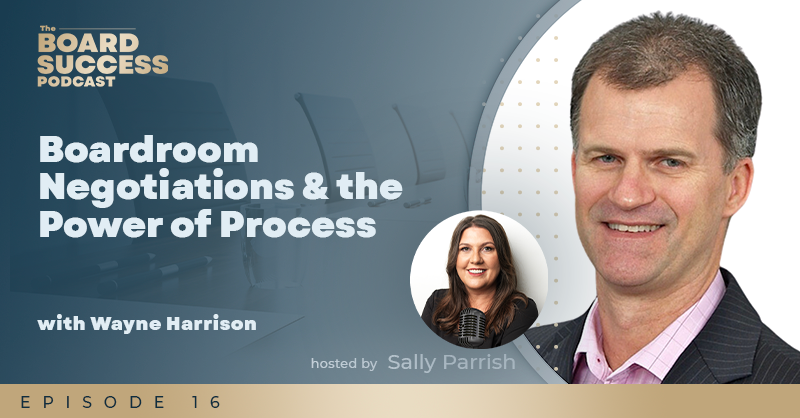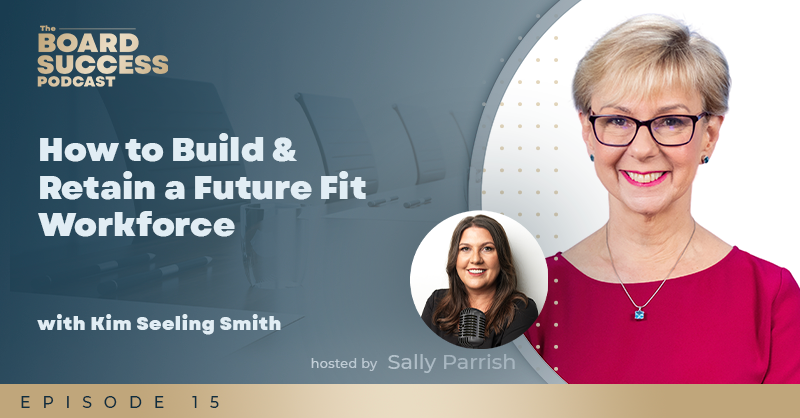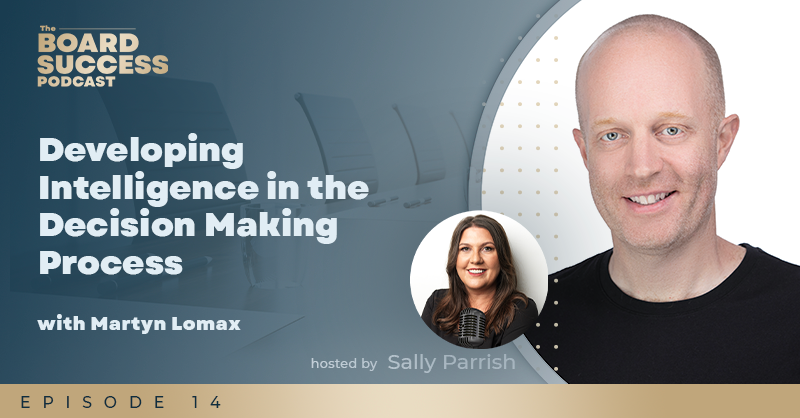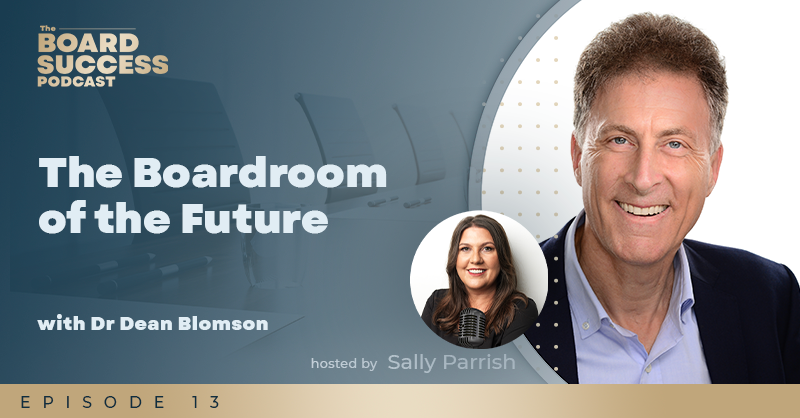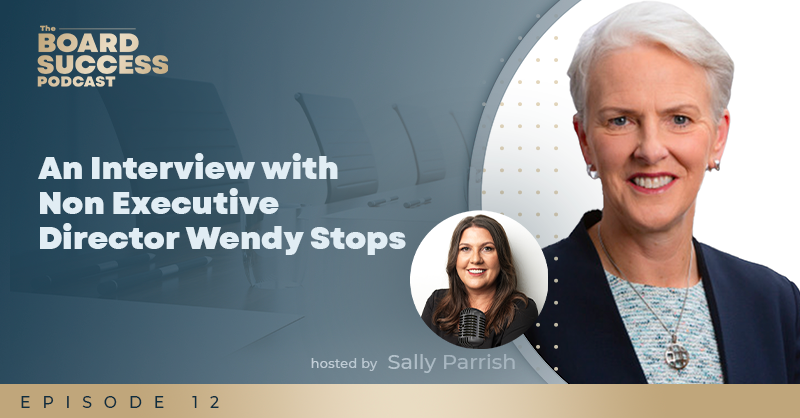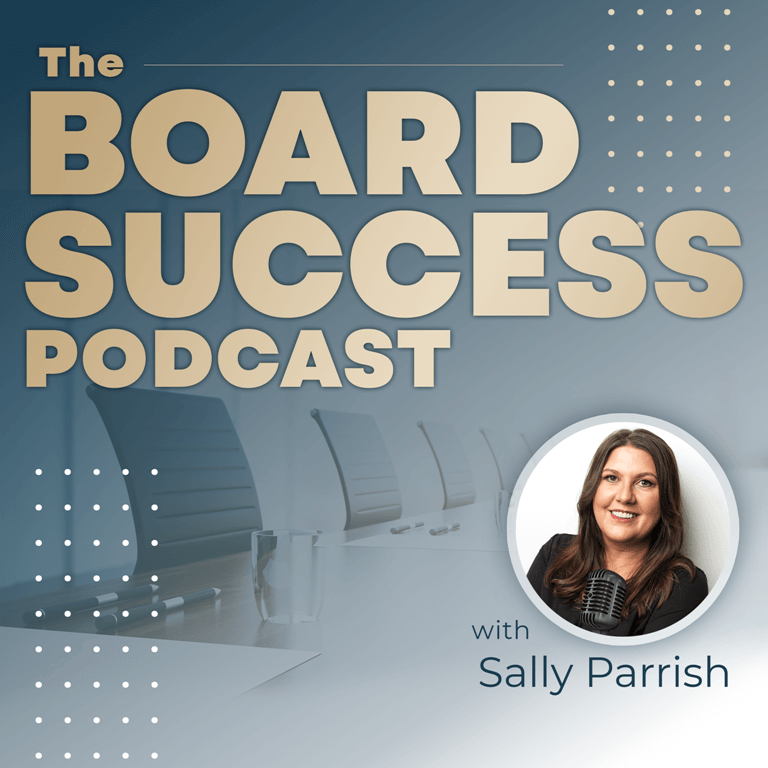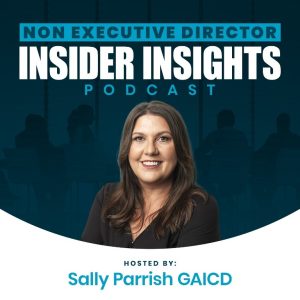An Interview with David Maywald
Sally Parrish interviews Non Executive Director David Maywald
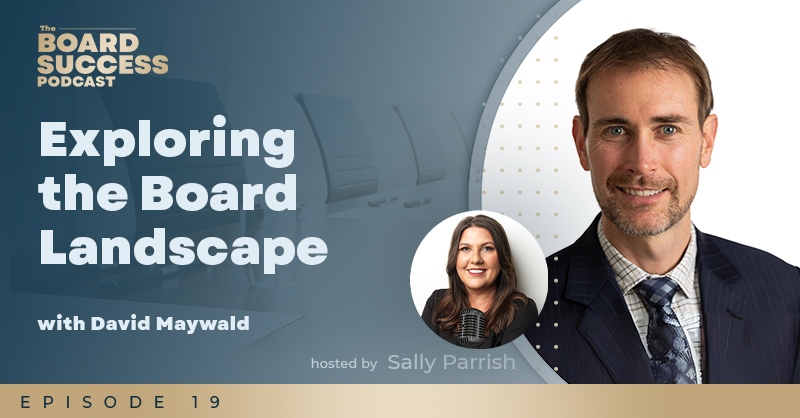
In this episode we explore some of the key questions executives have about the board landscape, including "Where can I find Board Opportunities?" and "How much do board directors get paid?"
Joining us to discuss his research on board remuneration is David Maywald. David is a Full-time Non-Executive Director for several companies and charities located across Canberra, Sydney, Melbourne, and Adelaide. He has held the role of Chair, Vice President, Treasurer, and Chair of many Board Committees.
David shares his personal reflections and insights from his research (published on Linkedin) and gives some sage advice for being realistic about your board aspirations and authentic in your approach to adding value.
FURTHER INFORMATION
Find David on Linkedin: https://www.linkedin.com/in/davidmaywald/
Read the article 'Thought Piece on Board Remuneration and Director Fees in Australia' mentioned in the podcast: https://www.linkedin.com/pulse/thought-piece-board-remuneration-director-fees-david/
Click Here to View the Podcast Interview Transcript with David Maywald
David Maywald 00:00
I think it's fantastic when Executives have Non-Exec roles. And it's quite common where you've got an executive who might sit on one or two organisations; sometimes Chairs them. And it really helps that empathy sitting on the other side of the table. Understanding what's a fantastic board paper? What's a clear recommendation? What's the line between governance and management? I think it really broadens out and deepens, an executive’s experience and ability to interact with boards.
Sally Parrish 00:29
Hi, I'm Sally Parrish, Amazon, Best Selling Author of the Essential Field Guide for company directors and founder of the Board Coaching Institute. I've been in on and around boards for over 20 years. And if you like me are passionate about the boardroom, then this podcast is for you. And I'd love you to join me on this mission to decode board success. What is it that sets some non executive directors apart from the rest? How can you enhance your leadership skills so you can be highly effective in the boardroom? And what will it take to make board success reality for you? I hope you enjoy these episodes as much as I love making them and that they unlock the secrets for you to gain a competitive advantage and have massive impact and influence in your board roles. Let's get started.
Sally Parrish 01:34
Joining us today from Canberra is David Maywald non Executive Director and AICD panellist participant. David, welcome to the board success podcast.
David Maywald 01:45
Thanks so much Sally. It's lovely to be here with you.
Sally Parrish 01:47
Let's start by hearing a little bit about your portfolio. You're now full time NED, can you walk us through some of the areas that you're working on right now.
David Maywald 01:56
Sure thing, well I picked up my first board role when I was at university 25 years ago as a treasurer for a small environmental NGO. And during my professional career as an investment manager, I've had a number of other non exec roles, including for Canteen, I did the company directors course just over four years ago, and made the transition out of financial services into a full time professional director. I'm currently on the boards of five organisations, three here in Canberra, including a public company, one in Sydney, and one in Adelaide. And most of those are registered charities,
Sally Parrish 02:30
Congratulations four years from GAICD to full time NED. That's quite the achievement. I know we're going to talk about this today. But some people think that that can happen a lot faster than that. But that's incredible, full time NED. So stepping out of the executive and into full time board work within five years. Now the reason that I've asked you to come along today is that you've got this incredible body of research that's all around the board landscape. So just talk us through the scope of that research. And what it was that prompted you to do it?
David Maywald 03:02
Yeah, well, last year, I was on an AICD panel called aspiring directors who were looking to find their initial board roles. And that discussion really prompted a lot of thoughts around their board landscape, and about the number of payrolls. And you know when I started looking for research on that type of broad perspective, I really couldn't find anything, there was a lot of research on the listed companies with their remuneration reports and visibility, there's a lot of great transparency for the government boards. And also ACNC provides an incredible amount of data for the registered charities. But once you go outside of that space, into the private companies, into the body corporates, into the unincorporated associations, sporting clubs, and so on, it's really hard to get good quality data. And I didn't find anyone and still haven't found any good analysis of the whole board landscape. And so I threw myself into a project which took about three months of gathering and piecing together the best quality information that I could find. And for myself, I found that a really fascinating project, intellectually and analytically. It did build on my 20 years as a research analyst and portfolio manager, I guess I bring that type of structure to questions and decision making. And I thought there was some valuable insights that came out of that work. And that's why I shared it publicly through LinkedIn.
Sally Parrish 04:24
Yeah, I was gonna say it's definitely prepared by an analyst. There's lots of deep dives into different areas. So you've got subsets within subsets; really fascinating report. And we're gonna put a link to that report in the show notes for anybody that wants the full information, but we're going to talk about some of the highlights from that and just generally some of your findings on your journey from transferring from executive to NED but also in supporting aspiring execs in their journey as well.
So we're going to look at three key areas. I think today the first one is around How easy is it to transition from executive to non Executive Director, then we're going to look at the not for profit landscape in particular, because there's a lot of myths around the not for profit area and whether or not that is the stepping stone for board success. And then thirdly, we'll look at some of that data that you've done around how much will I earn? I reckon that's the number one question that I ever get asked, How much do you earn as a board director? And the answer is very simple. It depends. And it's somewhere between zero that working as a volunteer, and I think the highest paid NED is on over one and a half a million dollars for one role. So the answer is, it's somewhere between zero and one and a half million. But I think your research is going to give us a bit more maybe parameters around a few more guidelines around that. So let's start with our first area. So we're talking about how easy is it? So thinking about someone who's in the C suite right now, they've had an incredible career, strong track record, a lot of successes, looking for the board role for the first board break? What do you find, typically, with that type of executive, David, in terms of their readiness, their preparedness for these roles,
David Maywald 06:15
They would be some of the most ready, particularly C suite experience for ASX listed companies you know within that the shape is still important. The demographics, gender, culture, racial filling those boxes, and the specific shape of professional experience, technical, functional Education, and background, there are gaps that have been necessarily filled in terms of technology, cyber culture that have been higher demand and the more generic larger categories of accounting, finance, business, legal and other classic needs of boards is very individual, isn't it? Like I said those people in C suites of listed companies have an advantage executive senior executives on listed businesses, managers within nonprofits, functional experts, it's different across the whole .
Sally Parrish 07:06
Yeah. And I think that shape and form that you're talking about a lot of people just saying, Well, I'm in a C suite now. And the board is the next step in the career ladder. And they look at that as a sort of a vertical progression, right, like a promotion from exec to board. And I've got a very different opinion, I consider the board role to be a career change, it's a very different way of working, it's a different use of your skill set. It's a completely different environment. So what would you say are some of the traps that people fall into when they look at transitioning to board roles?
David Maywald 07:45
I think it's fantastic when executives have non exec roles. And I've looked at a lot of CVs, a lot of LinkedIn profiles, and it's quite common, isn't it, where you've got an executive who might sit on one or two organisations, sometimes chairs them, and it really helps the empathy sitting on the other side of the table, understanding what's a fantastic board paper? What's a clear recommendation? What's the line between governance and management? I think it really broadens out and deepens. And executives experience and ability to interact with boards. One of the other issues, I call out is the challenge of skipping between your day life as an executive in management, and your occasional board meetings or committee meetings. And the common thing I see is that execs and managers continue to manage, and they find it hard to flip between those roles. And I can completely understand that it's like almost like multitasking. If your full time role, or your business depends on you being a manager but then in a 5pm board meeting, you're suddenly flipped into the governance space, that can be really hard, including for Chairs, because it might be a typical normal behavioural response to try and manage as a chair or a non executive director. And particularly when you have to flick backwards and forwards during the day or when you're stressed or time poor, that's really challenging. I have to say the big game changer for me was pulling out of my professional career. I went to four days per week and three days per week when my second child was born and then eventually left that role. And I found it much easier to only navigate the governance space, there was sort of a two-year transition period there were I was still involved in that business, but I had a couple of board roles and so it was looking backwards and forwards. But once I cut the tether and went all in, I found it much easier to consistently navigate the space as a non Executive Director rather than the flipping backwards and forwards
Sally Parrish 09:47
Very different hats to wear, aren't they and that delineation between the operational and the strategic governance side. I know that I've got clients that have said when they've got a foot in each camp what really helps you is physical board meetings rather than online board meeting, it's really hard to be at your desk on your laptop in a zoom call in an operational meeting. And then the next zoom call is a board meeting, it's really hard to make that transition. But a physical location actually allows you some kind of switching between the two, getting into that right mindset. And I think that's really important, right? Because you can have all the Operational Insights in the world, and they could really benefit the business, but it's not the arena for that. And it's not about talking to everything that you can speak to in the agenda, but it's about knowing when to speak and when to add value. And often those tidbits of information that are really, really useful actually derail the board meeting and take them too operational, they can be much more damaging than beneficial. So I'm glad that you've mentioned that. We were talking before the call about psychological bias as well, right? You see somebody do it, one of your colleagues suddenly picks up a great board role. And you think, Well, I'm as skilled as they are, or I'm better skilled than they are, I'll give it a shot myself, that whole psychological bias going on.
David Maywald 11:12
Yeah, I think a lot of people who look to make the transition, confident in they’re assertive, they back themselves, they might have had success in business, they've climbed up a ladder, and often been very successful. And they're incredible people to network with them to be on board with but sometimes we're a bit too optimistic about the value and the contribution that we can make. And that's necessary in seeking to establish a portfolio of non executive roles. But I guess when the rubber hits the road, is when you really have to look back at the shape of what you're able to contribute and what the perception is, or what you contribute, versus the hole that's needing to be filled in that individual organisation at that specific point in time. And personally, I can reflect back on when I was looking to add board roles,I was optimistic, confident, and probably a bit too overly optimistic about how much I could contribute, and to take a step back and accept the reality of there being an incredibly talented pool of prospective directors out there. And only so many well paid roles.
Sally Parrish 12:19
Yeah. and I think as well, if you're an executive, you're only ever applying for roles where you're really good at this thing that you do, right. In fact, you're the best at this thing that you do. And you've had a lot of success and a lot of confirmation bias around your successes. And so when you're going for an exec role, it's really easy to kind of dominate that area of expertise and showcase why you're the best person for that. When it comes to a board role that's only one dimension, right? That area of expertise that you have in the field is one thing, but then there's the governance ability, the oversight ability, the ability to stay above the line and be strategic. And I think Harvard recently described it as a T zone in terms of breadth and depth of expertise. Professor Dean Blomfield, he recently described it to me as you've got scuba divers, and you've got the snorkelers. So you've got the divers and snorkelers, people on the top and people that go deep. So you've got that layer, but then you've also got the alignment. What's the purpose of this organisation? What are they working on right now? What are the strategic plans? What type of skills do they need to drive this successfully? And how does that compare to you as an individual? what's your purpose? What's your value proposition? What are your values? What excites you, when I first start working with a client and I ask what success looks like to you? There's probably an ASX role. Okay. Right. So let's drill down what do you bring to that role? What industry? Is that in? What part of the business cycle are they in? What challenges are they facing right now? What's the likely crisis that they're going to face that you're going to add value to, how you're going to measure your successes, and there's so much more to it than let's just get a board role. And that leads us nicely to the not for profit space, because a lot of people out there believe that the first step to your board career is by starting in the voluntary board space. And there's a lot of voluntary board opportunities out there. So it's really not difficult to get on to a volunteer board. But there are a lot of misconceptions around those.
David Maywald 14:30
Yeah, absolutely. There are well meaning people that are passionate about the causes that don't necessarily understand the gravity of what they're going into, the duties and obligations and potential positive or negative impact they could have on the organisations and in the small to medium nonprofits space. There are a lot of people there who care a lot about the organisations but don't necessarily have the sharpness of professionalism or the up-to-date continuous improvement and learning that you commonly see in listed space and large unlisted companies and government to be honest and super funds. So that's challenging to navigate. And there's also a perception from management and CEOs occasionally that as just being volunteers, they don't necessarily have to take the directors seriously that they could dismiss or put less weight on the decisions and input that's coming from their board. Because there's less of a formal relationship. They're not actually paying those people. And it's the execs and the managers who were there every day, full time. employees are being there full time and paid sometimes by quite a lot of money, who have these volunteer boards turning up every one or two months discussing the key strategic issues, but not being anywhere near as well informed about the operations and granular details as they are.
Sally Parrish 15:48
I think sometimes they underestimate the workload, right? So they measure it in. So how many board meetings are there? So there's one board meeting every two months? And how long does that typically run for about four hours, well I can do that, 20 30 hours a year, I can fit that in. But actually, when you're on a board, you're on call, right? You may only be in a meeting for two hours a month, four hours a month, whatever that might be. But you've got your board packs, and that responsibility to be across all of those board packs and be well informed before you go into the meeting. And that might mean asking questions, doing research, before you even get into that board meeting. You've got the post meeting, reviewing the minutes, ensuring that everything's accurately recorded that things are actioned, things are happening. But you've got that, I describe it like parenting, there was a Ned that I interviewed that said, it's just like parenting, or you can drop your kids off at school. But it doesn't mean that they're not on your mind, right. And it doesn't mean that you're not going to get a call from sickbay at two o'clock today, right? You never know when the phone's gonna ring when the emails are gonna come. And some boards are very prescriptive around when you can and cannot reach out to the board and others it's just like open slather, right. And you've got the exec team phoning the board all day long on the board, phoning the exec team all day long. But I think this was really amplified during the pandemic, when there were a lot of well meaning non executive directors who were on not for profit boards in the health space. And I don't even think that a) people in that space would necessarily have the skills to navigate the pandemic and all that came with that in the healthcare space. But we've heard time and time again, board members and like CEOs, C suite go into the board and saying, we haven't got enough people, we've got enough beds, we can't manage this. We can't manage that, this is happening, that's happening. And the board respond with, “we're just volunteers. We're just volunteers”. We can't help you that phrase should never be uttered from a board should it doesn't matter if you're getting paid or not getting paid. And you said that you can have people that are really passionate, but not necessarily skilled. So we talked about well meaning in that space, right. But you can also have people that are really skilled, but don't have that alignment. They don't have that passion. And that was me. One of the first roles I took, I took because I got asked, and I was flattered. And I thought, yeah, sure, I'll go and help this board that needs me. It's not that I didn't do my job. I did my job. And it's not that I wasn't diligent. I was, but I had no interest in that role. And those board meetings are long board meetings when that alignment isn't there.
David Maywald 18:28
Yeah. And it's the gravity of this really is felt in the nonprofit space because, for example, some organisations provide aged care, childcare, vulnerable groups, disadvantaged groups, and communities. And so the ethical as well as the legal and compliance obligations have a huge gravity and the implications for minors, child safety, health and safety, aged care. And you've got, sometimes contractors going into client sites. So there are some really, really important issues. And well beyond the financial implications of the cost of doing business or having to deal with audits and regulators, there are important social ethical issues that have a lot of gravity. And it can be say, a very large for profit aged care provider that has lots of residential aged care facilities, pay board members, professionals, elite people that come out of incredible careers in corporates and government and other areas, compared to say, a local community organisation that has made the transition from servicing that local community to coming within the scope of formal aged care service provision, Commonwealth funded, your quality standards have increased and increased. You come through a Royal Commission, suddenly, you've got these volunteer board members who might have been volunteers for the organisation who transitioned into a governance role, but what they're being asked to do now in terms of meeting those standards, and the compliance and legal obligations on their shoulders is very different to the initial years of contributing to the organisations and doesn't necessarily get easily dealt with by the regulatory and compliance frameworks that we had, which tend to be a bit tick a box and abstract and reductive. Whereas the reality, like you're saying, there's a behavioural aspect that where you've got a volunteer and a well meaning director, who might feel that it's unreasonable to be asked to sign a quarterly report to the regulator confirming that the finances or the quality service provision are adequate, and also it hadn't necessarily had the training, education, professional development, because the organisation has such thin margins, it hasn't provided the satisfactory induction, it hasn't had ongoing continuous learning, a lot of that's put on the shoulders of the voluntary Ned's for small and medium, nonprofits and registered charities. And if you've got a full time job, or a business plus a family or other caring commitments, that's really challenging to juggle your self funding, you have to find the extra time. So this is why I think there is a role for full time professional directors in the nonprofit space who approach a professional like I do. I'm very eager to engage in professional development and continuous learning and take the roles very seriously.
Sally Parrish 21:27
And there's also the argument that should not for profits pay their board members, right? Because the argument is that the more professionally qualified and remunerated your board members are, the more value that the organisation is going to get overall, anyway. So I think we've both seen it in our professional careers, where you’re sat around the table of a not for profit, and everyone is there for different reasons. And some of them because they're passionate, some are there because they're highly skilled, some are there because they want a line on their resume. And it's interesting that you talk about some of those more highly-regulated environments tend to be the areas where there's more not for profit opportunity. And I've seen it where the boards aren't really across the legislation, and they're saying to the CEO, are you confident that we're meeting all of our requirements? And the CEO goes, “Yes, we are”. And they go through that sack crossed off then Right? That's not the boards job, the board's job is to verify and validate and question and to have assurance in those areas, not to ask the CEO are you confident that you've done these things? What tips can we give our listeners today who might be looking for their first role and contemplate in the not for profit space? In terms of the top three tips? What would you say?
David Maywald 22:47
Certainly the alignment there needs to be really strong, it has to be a cause that resonates with you personally, that means a lot to you. David Gonski talks about this, you mentioned at the Australian Government's Summit, if it resonates enough, if you're passionate about it, you will naturally lean in. You will spend your time at the sites you will get to know the clients, you will understand the issues in different perspectives. The second one would be approach it as a professional, you will have to invest, you will have to put time and money and even for example, one of my paid roles I received a small payment. But actually I put more money than that into attending board meetings, professional development, extra time and effort to contribute, because I take it really seriously and I care about the clients and their outcomes and the impact that we're having. And not necessarily a stepping stone. If you're passionate about these causes, you might find yourself contributing for 10 years on a board and then transition over to another organisation that then takes your interest at that time. I think there's a role for professional directors outside of companies, outside of government, nonprofit, registered charity, sporting and other spaces, possibly in the future.The large owners, corporations, body corporates might be forced to increasingly pay its come up recently, the Sydney Morning Herald had an article recently talking about body corporates and about your multimillion dollar budgets that their maintenance sometimes defect rectification for large high rise apartment buildings these are really expensive assets to build. And classic, it has been a voluntary management committee, but they have very similar roles to a governing body or representatives. They've got some decision making power, they outsource often to service providers. So they're navigating a governance space. So this is an area I think that can be an ongoing contribution. And not necessarily I don't look at it as a stepping stone on seeing an ongoing contribution there that's really worthwhile and not necessarily from a financial perspective, but from social, environmental, family. And resonating with your personal values.
Sally Parrish 24:53
Yeah, I love that. There's a lot of body corporates out there grappling with the whole flammable cladding issue right that’s an incredibly complex, dangerous area to be making decisions in if you're just there as a volunteer just to get a bit of experience, and you've got a passion for the apartments that you're living in, or the complex that you're living in right now. I just want to add to what you've said, because talking about responsibilities there, and there is a myth out there that the volunteers have no responsibilities, they can turn up just to their best and every little helps. So just for anyone listening who thinks that might be the case, just know that there are just the same responsibilities and liabilities on non executive directors in the not for profit space, as there are the commercial space. So please, don't ever go into this thinking that. It's a stepping stone because there aren't those responsibilities. And to speak to that, I’m adding value, I'm helping out unless you're aligned, like David said, unless you're fully committed, unless you're leaning in, you really are a waste of a seat and a board. And we know that boards can be far more effective with fewer people who are passionately leaning in, and with a big team of people who aren't really contributing. So don't ever think that you're doing the board a favour by joining them unless you are anything other than 150% dedicated. And that stepping stone, that's a really good point, right? Because I often talk about reverse engineering your board career. So look at the board portfolio, you want reverse engineer from there today to think about how you're going to get there. And a lot of people do think of not for profit boards as a stepping stone. So you quite rightly said it might not necessarily be a stepping stone, it might be step one, and you end up there and you stay there. But also, if you're using a not for profit as a stepping stone, you've got to be really clear as to what that's a stepping stone for. So is it around building a certain skill set? Is it around gaining a certain level of governance experience? Is it around the people who are on that board and who might mentor you because you've got to make sure that those things exist on that board, if that's what you're using them as a stepping stone for. Alright, third and final piece, let's get into this research that you've done because this is really exciting, right? So how much opportunity is out there? And how much can we get paid as non executive directors?
David Maywald 27:12
When you take a step back and look at the whole landscape, the best estimate that I had was about half a million boards in Australia. And that's the broadest sort of view of the landscape. But think about some sub segments of those listed companies, there are only 2000 ASX listed companies, whereas there are 60,000 registered charities on the ACNC database. So that's a factor of 30, to go from to 60. And those two are the areas where it's easier to get the data there, obviously, low number of 1000s of Commonwealth and state government boards as well, very small number 100 or so large super funds. And then there are the unlisted companies. That's a space that's quite hard to get visibility on. Because for the smaller unlisted companies, you might only have the founders or the big shareholders and others, when that's small and younger. Often they do go through the point of hiring their first non executive independent director. And I guess that's the threshold that I see for calling that more of a board. Rather than being a management committee or being a hybrid committee. Two executive directors does that count as a board, it's when they’re both shareholders and both been founders I’m not sure you can really call that part of the board landscape. And the startups obviously are different as well, where you might be able to buy yourself a board role in a startup, but they might be more interested in your money than interested in your governance contribution. So outside of those areas, there are another couple of big categories of boards in Australia. There are the unincorporated associations and non registered nonprofits, and non listed charities. And that includes sporting and community organisations and many other bodies that you see, but reach that threshold of being registered. And within the 60,000 on the ACNCs website. And a lot of people love this sport. They're involved. They might be on a management committee, they might de facto fall into a governance role, school boards as well. And like I mentioned that body corporates where a lot of people don't necessarily think of the board. They don't recognise it as a governing body. But I mentioned some of the similarities to boards that you're representing the broader group of owners that there's decision making power, you're outsourcing the operations to a third party. So I see those roles as being quite similar. If you're on a body corporate or school board, or if you're a leader in your sporting organisation. You've got similar functional responsibilities, maybe slightly different legal responsibilities depending on which category you are in. So that's what I see is the broader board landscape. And within that, there are a small number of well paid roles. And those tend to be obviously listed companies, the large unlisted private companies, as mentioned, the larger nonprofits, the registered charities but that's less than 5% of registered charities paying. And within that only a small percentage of the very top end pay well, mentioned super funds, and then government boards. So those would be the most attractive. And for the really well paid directors, it's probably 3% or so out of the whole pool. And you framed our discussion earlier around C suite execs particularly with skill sets and expertise and capability that's amenable to governing roles would be in a sweet spot for competing for those well paid roles.
Sally Parrish 30:41
So when you say a small number of well paid roles, how many roles are there, and what's your benchmark for well paid?
David Maywald 30:50
The research that I've done, has tried to draw on public available information surveys, and it tries to piece together those different categories. And so the best visibility does come from the listed companies and remuneration reports. And some of the disclosures around key management personnel for registered charities as well as the disclosures from state and federal governments. So that's probably where there's the best visibility. There’s not good visibility for unlisted companies, which don't have anything like the transparency requirements getting into the listed space. And my best estimate is that they're about 17,000 boards that are paying well with about 100,000 non-executive directors in that space. And if you think about that, that bigger landscape where you might have two and a half million or so non executive directors across all those million boards, it's a pretty small percentage.
Sally Parrish 31:48
A half a million non executive directors across a million boards.
David Maywald 31:52
So that's my best estimate of approximately half a million governing bodies.
Sally Parrish
Yeah, Yeah
David Maywald
On those, there would be about two and a half million. So positions, obviously, you got to be double ups, right? Because some people like myself have multiple roles.
Sally Parrish
Yeah, it's hard to know how many roles? Yeah,
David Maywald
Yeah. And so they're my best estimate of those roles. And paid roles is more around 100,000, out of the two and a half million,
Sally Parrish 32:20
And that 100,000, give or take about 20,000, right, it's somewhere between about 73,000 and 120,000. So in a nutshell, there are around 17,000 boards who appoint around 93,000 NED positions. So that could be someone holding multiple positions, but 93,000 NED positions paying somewhere between $73,000 and $120,000. And then obviously, there's a lot of information out there, that's not available, there are a lot of roles that are a lot higher than that, the vast majority are unpaid. So it's really, really difficult to get that data. But I think that's the closest we've ever come in this industry to really understanding what the reality of that board landscape is,
David Maywald 33:05
There's a pretty good understanding about where the better paid roles are. Because we have the visibility on remuneration reports in the listed space. And you can make assumptions, translating that across to the unlisted space. If you've got companies with about the same revenue, about the same employment base, similar profitability, then there'll be assumptions made about how much they're paying their directors. So private equity can pay very good money, sometimes supercharged by having shares in the companies as well, which is total remuneration. So the average for listed company directors, which you can see from our research, is over $100,000 per non executive director. And clearly, if you're a chair, or if you're on multiple committees, then you can take home more than that. Again, the super funds pay pretty well, although they're a very small number of them. And they've been consolidating, and it's quite challenging to get onto those trustee boards, unpaid companies, the larger ones are paying quite well. But we don't have good visibility there. And I've been pretty clear in my research that there's a big error band, and big estimation band around those and then the state and federal governments tend to pay reasonably well. There's great gender equity, for example, we've surpassed the gender parity for Commonwealth Government boards. So it can be a fantastic option for really talentedly female directors, who are establishing their careers, Similar paying to local councillors. And if you think about that, it's a governing board, making ordinances and representative and have a range of duties as well, which is interesting that local councils pay quite similar to some of the government boards, but then the lower levels of pay rates to charities, and from a number of different data points. They range sort of there from $15,000 to $30,000. around $20,000 or so for the role paying roles in registered charities.
Sally Parrish 34:55
Yeah, really, really interesting. So we'll put a link to your research in the show notes. So there's a full report. All the assumptions and everything's in that report for anyone that wants the detail. But I think in summary today, David, what we're saying is that think about the right role for you in terms of your fit the alignment, what that looks like, have a look at not for profit as a stepping stone, but make sure that you're truly thinking about what that stepping stone is to and how you're going to add value while you're in that stepping stone. And the reality that boards can be lucrative, they absolutely can. But there's a lot less opportunity out there than we'd like to think, that there is nonetheless there's still nearly 100,000 NED positions out there for the right people. And those with the right skills that are leading with purpose and alignment are the ones that are going to land those.
David Maywald 35:47
Absolutely. Hopefully more boards will pay as well. And they'll recognise the value that's being contributed by the directors and also improve the culture of incorporating governance integrally into the organisations.
Sally Parrish 36:01
Yeah. And also that there are lots of benefits of being in an unpaid role anyway, personal growth, professional growth, that development, that directors mindset transfers to your executive role and makes you a better performing exec because you understand what the board does, and you can report more effectively, you can present more fluidly, you understand all of that. So there are other benefits. Financial is just one aspect that we're looking at today. But there are other aspects of those not for profit, voluntary roles as well. David, thank you very much for the research that you've done for being a thought leader in this space. Really appreciate it. And thanks for joining us today.
David Maywald
Pleasure speaking with you. Thank you.
Sally Parrish
Thanks very much for tuning in. I'd love to know what you thought of this episode and what you took away from it. I'd also love to know what topics you're interested in hearing about in the future, and which experts you think should be featured on this board success podcast. If you enjoyed listening, please share with your colleagues who might also have an interest and make sure you click to follow us, or subscribe to be advised about upcoming episodes. In the meantime, if you're a leader or a successful executive, and you're looking to launch your board career, or if you're an established non Executive Director, and you're ready for the next level, check out the resources we have available for you on the website at boardcoachinginstitute.com.au. Until next time, here's to your board success.
Explore more episodes
